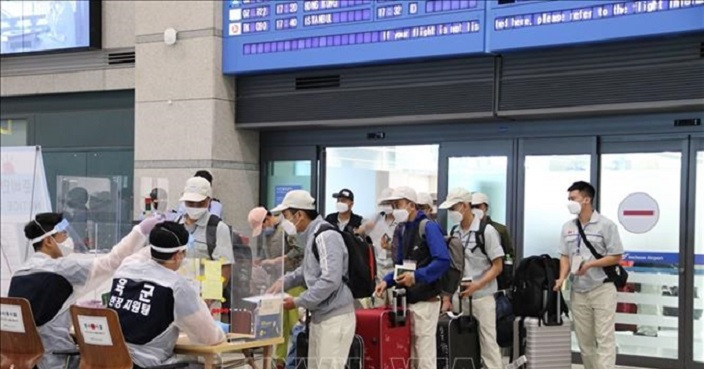These numbers show that outsourcing is not just about jobs – it is an important strategy for job growth and socio-economic development.
Thiên Lộc Commune in Can Lộc District, Hà Tĩnh Province, boasting a population of over 7,500, serves as an important hub for overseas workers.
Currently, 1,367 employees work abroad, with important markets including Germany, France, the Czech Republic, South Korea and Japan.
Many other areas in Hà Tĩnh Province also have large numbers of foreign workers.
In the past 10 years, Hà Tĩnh Province has had more than 80,550 foreign contract workers, an average of more than 7,500 per year.
In 2023 alone, more than 12,000 people from the province went to work overseas, mainly in traditional labor markets such as Taiwan (China), Japan and South Korea.
According to data from the Department of Labour, Invalids and Social Affairs in Hà Tĩnh Province, foreign contract workers from the province usually earn between VNĐ6.8-7 trillion (US$272-280 million) every year.
A large part of this money, more than VNĐ4 trillion ($160 million), is repatriated in foreign currency.
This money has an important role in increasing economic development, promoting entrepreneurship, supporting corporate businesses, and financial initiatives aimed at poverty reduction, rural development and social welfare programs across the province.
In the coming years, Hà Tĩnh Province plans to send about 8,000 workers overseas every year, expanding beyond traditional markets to include countries such as Germany, Russia, Australia, Israel and other European countries.
In Thái Bình Province, efforts to export local workers have produced significant economic and social benefits. Every year, remittances from home exceed US$83 million, mainly from returning workers with valuable skills and expertise, especially from markets such as Japan and South Korea.
The province recently experimented with sending seasonal workers to South Korea, with 105 people from the three districts of Quỳnh Phụ, Vũ Thư and Kiến Xương.
Some outstanding workers have even received long-term contracts, demonstrating the quality of Vietnamese workers and boosting confidence among foreign employers.
The move to send Vietnamese workers abroad, seen in provinces such as Hà Tĩnh and Thái Bình, has always been a priority for the government.
Efforts are focused on safe, high-paying sectors, particularly those that benefit workers from disadvantaged backgrounds.
In 2023, Việt Nam sent more than 159,000 workers abroad, exceeding the target by 33.3 percent.
The Ministry of Labour, Invalids and Social Affairs (MoLISA) facilitates the deployment of non-profit programs and expands dialogue with partners in South Korea, Germany and Australia to expand opportunities.
By 2024, MoLISA aims to send 125,000 workers overseas under contracts, focusing mainly on established markets such as Japan, Taiwan (China) and South Korea.
Demand for foreign workers in South Korea, Japan and Germany is increasing, creating favorable conditions for ongoing and future programs.
In the recent meeting of the National Assembly, MoLISA minister Đào Ngọc Dung revealed that, in accordance with the laws to send Vietnamese workers abroad, an average of 120,000 out of 143,000 Vietnamese citizens go overseas for work every year, they generate a lot of annual income. about $ 3.5 – 4 billion.
To strengthen the personnel system
The Department of Overseas Labor Management reports that, according to business data, March 2024 saw a total of 12,738 Vietnamese workers sent overseas.
In total, the first quarter of 2024 saw more than 35,930 workers travel abroad under contractual agreements.
Core markets such as Japan and Taiwan (China) continue to dominate the reception of Vietnamese workers, as well as other important destinations such as South Korea, China, Singapore, Romania, Thailand, Thailand, Saudi Arabia and Hungary .
Despite the positive results, Vietnamese overseas workers face various challenges, including contract violations and illegal immigration in countries such as South Korea, Taiwan (China) and Japan, which motivated by the desire to stay longer and higher wages compared to contract work.
In response to these issues, in 2023, MoLISA temporarily suspended the employment of workers under the Employment Permit System (EPS) for eight districts across four provinces due to difficulties in repatriating workers. their own when the contract is over.
In Romania, the most important market that hosts about 11,000 Vietnamese workers, visa procedures are being streamlined and the demand for foreign workers is high.
However, recent cases of contract evasion and illegal migration to other countries are tarnishing the reputation of Vietnamese workers.
MoLISA issued an order in early 2024 encouraging businesses to deal with this problem seriously.
Businesses that send workers to Romania are required to educate them about the dangers of running away from the contract and the importance of complying with local laws. In addition, they have to analyze the information of workers who have been fired from their hometown to make recruitment strategies for future deployments.
Recently, the government revealed a plan to implement Directive 20-CT/TW from the Party Central Committee, with the aim of strengthening the Party leadership by sending Vietnamese workers abroad.
This plan not only provides the means of sending overseas but also highlights the measures to strengthen the legal commitment among the workers, to prevent the crime and illegal stay, and to improve the methods of coordination to solve problems that arise. — VNS
#Vietnam #promotes #overseas #job #opportunities
